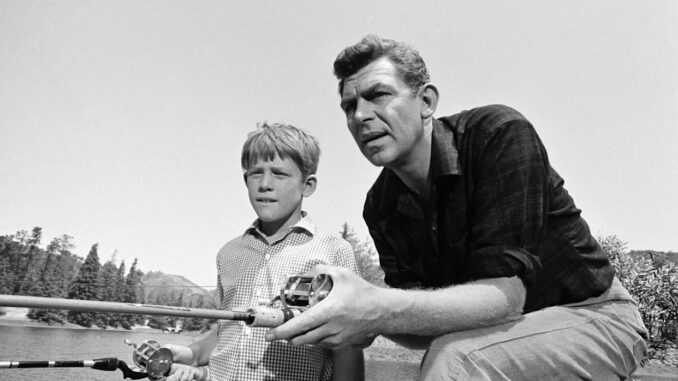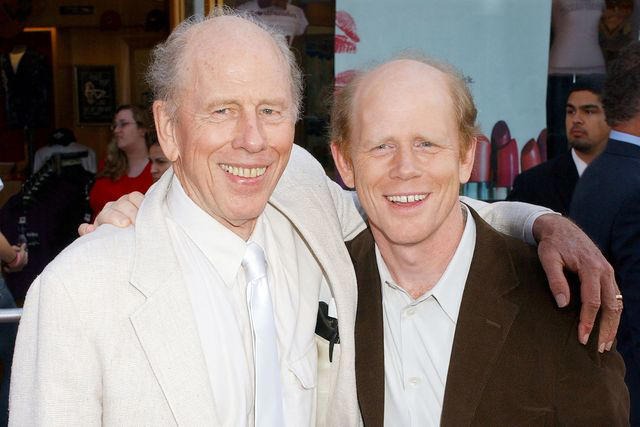
Introduction
When you think of The Andy Griffith Show, images of Mayberry’s charming streets, Barney Fife’s comical antics, and Opie Taylor’s innocent smile instantly come to mind. But behind the laughter and timeless lessons, there’s a fascinating story about how a father’s wisdom quietly shaped one of the greatest TV comedies of all time. Ron Howard, who played the young Opie, once revealed that his father, Rance Howard, gave a simple suggestion that helped fine-tune the show’s humor and storytelling. That one tip—though small—made a huge difference. Let’s explore how a single piece of advice turned The Andy Griffith Show into an enduring classic.
The Legacy of “The Andy Griffith Show”
Before diving into Ron Howard’s father’s contribution, it’s important to understand just how massive this sitcom was. Running from 1960 to 1968, it became more than just a comedy—it was a cultural landmark. For eight seasons, the show dominated American households, offering a wholesome look at life, family, and community values. Even today, reruns attract millions of viewers, proving that Mayberry’s magic is timeless.
Who Was Rance Howard?
Rance Howard wasn’t just Ron Howard’s father—he was a respected actor and writer in his own right. Appearing in countless TV shows and movies, including westerns and dramas, Rance had a strong background in performance. He understood timing, character development, and, most importantly, the subtle art of storytelling. It was this experience that allowed him to offer a golden nugget of advice that would ripple through the fabric of The Andy Griffith Show.
Ron Howard: The Boy Who Played Opie
Ron Howard was only six years old when he stepped into the shoes of Opie Taylor, Andy’s curious and lovable son. Despite his age, Ron delivered performances that were natural, charming, and full of heart. Much of that talent came from the guidance of his father, who not only coached him but also offered insights that producers eventually embraced. Ron himself has admitted many times that his dad’s influence went far beyond parenting—it extended into shaping television history.
The Simple Suggestion That Changed Everything
So, what exactly did Rance Howard suggest? According to Ron, his father encouraged the writers and cast to lean into realism. He emphasized that even though The Andy Griffith Show was a comedy, it shouldn’t rely solely on over-the-top jokes or slapstick. Instead, the humor should come naturally from real human behavior and relatable situations.
This approach was groundbreaking at the time. While many sitcoms of the era thrived on laugh tracks and exaggerated gags, Mayberry’s charm lay in its authenticity. Thanks to Rance’s suggestion, the writers crafted stories where the laughs flowed from genuine character interactions rather than forced punchlines.

Why Realism Worked in Mayberry
Imagine Andy Taylor patiently teaching Opie a life lesson, or Barney Fife bungling his way through law enforcement duties. The situations were funny, yes—but they were also believable. Audiences saw themselves in the characters, which made them fall in love with the show even more. Rance Howard’s simple suggestion essentially anchored the series in reality, ensuring that Mayberry felt like a real place rather than just a TV set.
Andy Griffith’s Response to the Advice
Andy Griffith himself valued authenticity. He was a master of blending comedy with warmth, and Rance’s idea aligned perfectly with his own instincts. Griffith believed the heart of the show wasn’t just in the laughs—it was in the lessons. That’s why so many episodes ended with moral takeaways wrapped in humor. When Andy heard this advice, he doubled down on making sure The Andy Griffith Show stayed grounded, warm, and relatable.
Don Knotts and the Power of Subtle Comedy
Nowhere was realism more important than in the character of Barney Fife. Don Knotts played him as exaggerated yet believable—a bumbling deputy who was still lovable at his core. Without the foundation of realism that Rance Howard emphasized, Barney could have easily become a cartoonish caricature. Instead, he became one of television’s most beloved sidekicks.
How It Shaped Ron Howard’s Career
Growing up on a set that valued authenticity influenced Ron Howard’s future. He later became one of Hollywood’s most respected directors, known for his ability to tell deeply human stories in films like Apollo 13, A Beautiful Mind, and Cinderella Man. Ron has openly credited his father for shaping his understanding of storytelling, proving that Rance’s advice stretched far beyond Mayberry.
A Father’s Guidance Beyond the Camera
Rance Howard didn’t just advise the show; he also guided Ron in navigating Hollywood as a child actor. He made sure Ron stayed grounded, teaching him to focus on craft rather than fame. In many ways, his wisdom mirrored the lessons Andy Taylor gave Opie—life lessons rooted in humility, honesty, and kindness.
The Ripple Effect on Sitcoms
The success of The Andy Griffith Show set a precedent for future sitcoms. Programs like The Waltons and Little House on the Prairie embraced realism in storytelling, focusing on heartfelt family dynamics rather than cheap laughs. Even modern sitcoms like The Office and Parks and Recreation thrive on humor drawn from real-life scenarios—a direct descendant of the Mayberry formula.
Why Fans Still Connect Today
Part of what keeps The Andy Griffith Show alive is its relatability. The characters may have lived in the 1960s, but their problems, relationships, and quirks feel timeless. Whether it’s a father guiding his son, a community coming together, or a bumbling sidekick trying his best, the show resonates across generations. And it all circles back to that one key idea: keep it real.
The Hidden Genius of Small Suggestions
It’s fascinating how a single suggestion—something that could have easily been ignored—had such an enormous impact. Sometimes, greatness doesn’t come from grand gestures but from subtle shifts in perspective. Rance Howard’s advice is proof that small ideas can create ripples that last for decades.
Lessons We Can Learn from Rance Howard
What can we take from this story? That authenticity matters. Whether in television, relationships, or work, people connect to what feels genuine. Just like Mayberry thrived on simple truths and heartfelt moments, our lives too become richer when we embrace honesty and realism.
The Howard Family’s Lasting Legacy
Today, Ron Howard continues to honor his father’s wisdom in his directing career, while Rance Howard is remembered not only for his acting but also for the subtle yet powerful way he influenced one of TV’s greatest shows. Their story is a reminder that sometimes the biggest contributions happen quietly, behind the scenes.
Conclusion
The Andy Griffith Show remains a classic not just because of its humor, but because of its heart. And behind that heart was a father’s simple advice: keep it real. Rance Howard may not have been a household name like his son, but his influence helped create a show that continues to charm audiences more than 60 years later. It’s proof that sometimes, one small suggestion can change everything.
FAQs
1. Who was Rance Howard?
Rance Howard was Ron Howard’s father, a professional actor, and writer who gave important advice that helped shape The Andy Griffith Show.
2. What suggestion did Rance Howard give?
He encouraged the show’s creators to focus on realism, making sure the comedy flowed naturally from believable characters and situations.
3. How did this advice impact the show?
It made Mayberry feel authentic, allowing audiences to connect deeply with the characters and stories, which helped the show become a timeless classic.
4. Did Andy Griffith agree with Rance Howard’s idea?
Yes, Andy Griffith valued authenticity and believed that the show’s strength lay in its heart and relatability, aligning with Rance’s suggestion.
5. How did this influence Ron Howard’s career?
Growing up with this perspective taught Ron the importance of authentic storytelling, which he carried into his directing career, shaping some of Hollywood’s most memorable films.